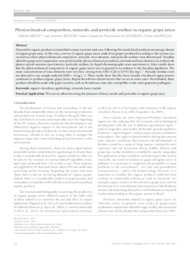Physicochemical composition, minerals, and pesticide residues in organic grape juices.
Physicochemical composition, minerals, and pesticide residues in organic grape juices.
Autoria: MIELE, A.; RIZZON, L. A.; QUEIROZ, S. C. do N. de; GIANELLO, C.
Resumo: Demand for organic products is intensified in many countries each year. Following this trend, Brazil produces increasing volumes of organic grape juice. In this way, a survey of organic grape juices made from grapes produced according to this system was carried out where physicochemical composition, minerals, trace elements, and pesticide residues were determined. Variables related to grape juice composition were performed by physicochemical procedures; minerals and trace elements, by inductively plasma optical emission spectrometry; pesticide residues, by liquid chromatography-mass spectrometry. Main results show that the physicochemical composition of organic grape juices was in general in accordance to the Brazilian legislation. The mean concentrations of trace elements were very low, varying from 0.002 (Cd) to 0.970 (Ba) mg L?1. Pesticide residues were not detected in any sample analyzed (MRL= 10 μg L?1). These results show that the Serra Gaúcha viticultural region present conditions to produce organic grape juices, despite the adverse climate factors that occurs in some years. Nevertheless, these products should be made with grape varieties, such as the labrusca ones, less susceptibles to the main grapevine pathogens.
Ano de publicação: 2015
Tipo de publicação: Artigo de periódico
Unidade: Embrapa Uva e Vinho
Palavras-chave: Agrobiologia, Agrobiology, Agrotóxico, Metais pesados, Minerais, Organic viticulture, Resíduo químico, Suco de fruta, Uva, Viticultura, Viticultura Orgânica
Observações
1 - Por padrão são exibidas publicações dos últimos 20 anos. Para encontrar publicações mais antigas, configure o filtro ano de publicação, colocando o ano a partir do qual você deseja encontrar publicações. O filtro está na coluna da esquerda na busca acima.
2 - Para ler algumas publicações da Embrapa (apenas as que estão em formato ePub), é necessário ter, no celular ou computador, um desses softwares gratuitos. Sistemas Android: Google Play Livros; IOS: iBooks; Windows e Linux: software Calibre.
Acesse outras publicações
Acesse a Base de Dados da Pesquisa Agropecuária (BDPA) para consultar o acervo completo das bibliotecas da Embrapa.

